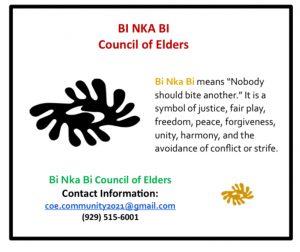
Bi Nka Bi Council of Elders
During the Town Hall Meeting at our 2019 Akom Kese Conference, the topic of discussion was Eldership. During that meeting, we the community in America, developed a consensus on what eldership means, the responsibilities of an elder, and an elder’s attributes. Guided by the vision of Akom Kese Board President Dr. Kwesi Amoa, the Akom Kese Board of Directors endeavored to operationalize the community’s thoughts on eldership into a Council of Elders that will guide the Akom community now and in generations to come. In conducting our due diligence to understand the concept of eldership within the Akan Culture, and in order to replicate this traditional relationship between the elders and the community, the Board established a Committee on Eldership. The Committee on Eldership was charged with researching eldership in African traditional societies. The Committee interviewed elders within the Akom community in America and in Ghana. In addition, the Committee researched the literature to understand the meaning of eldership and the process for selecting elders and other leadership roles within African traditional societies. Our finds were:
What is Eldership
Eldership is a title of esteem and of great responsibility that, while it tends to come with age, is not automatically given because of one’s age. Eldership must be earned through good character; adherence to the society’s accepted code of conduct; serving as a steward and repository for the history, culture, beliefs, and practices of our community; and a dedication to continuous lifelong learning and teaching.
Attributes of an Elder
An elder is not necessarily the oldest person in the community yet is seen as a wise person and is of good counsel. An elder provides advice to members of the community, sets the tone for what is acceptable behavior, and leads the community, especially the youth, by example. An elder is a protector of the community and culture and is ever vigilant in so doing. And most important, an elder acts and speaks with integrity throughout every facet of their life.
Bi Nka Bi means “Nobody should bite another.” It is a symbol of justice, fair play, freedom,
peace, forgiveness, unity, harmony, and the avoidance of conflict or strife.
